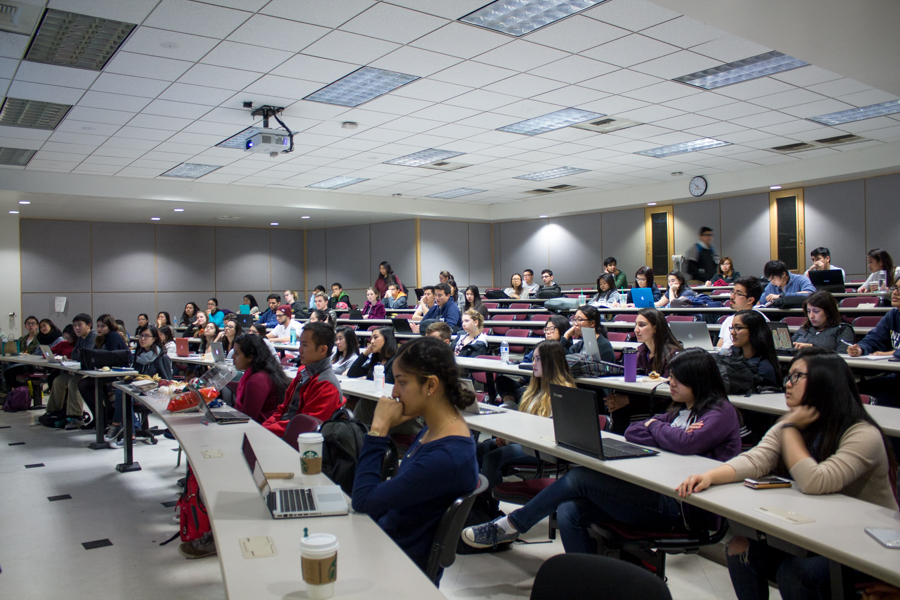
UC Davis First-Year Seminar program offers wide variety of classes.
From romance to cheddar cheese to zombies, the UC Davis First-Year Seminar program has it all. Students can choose from up to 200 seminars each year, with topics ranging from Japanese art to Davis culture to earthquakes to the NFL. Each seminar has an enrollment of up to 19 students and is led by UC Davis faculty.
Zombies
Taught by English and economics professor Sean McDonnell, Zombies is a seminar that studies the culture, history and values behind an array of zombie films, such as “White Zombie” and “Night of the Living Dead.” Each week, the class focuses on a different film to discuss its connection with various topics such as consciousness, societal stability, gender, race and humanity.
“After the first week, […] the students really take over [the discussion],” McDonnell said. “They [come] up with stuff that I [have] never heard of or thought of before.”
The class is driven by student participation and requires students to complete short readings and writings about the weekly film in preparation for the discussion. Students also engage in film criticism and theory, and learn to look at popular culture through an intellectual perspective.
Experimental Magic
Another available seminar topic is the art of magic. Co-instructed by psychology professor Eve Isham and magician Rick Hill, the seminar is a hybrid class focusing on both cognitive psychology and magic. The class encourages students who are interested in magic to investigate the scientific process involved in the art. Experimental Magic focuses on a variety of concepts, including close-up magic, which involves card tricks and similar magic tricks for smaller audiences.
“When you’re doing close up magic, you’re really relying on hard work to get you [the desired effect],” Isham said. “It’s definitely something that [you] could […] appreciate once you learn what it’s all about.”
The class covers experimental designs and demonstrations of tricks, some of which are taught to students over the course of the quarter.
What Makes Airplanes Fly?
Mechanical and aerospace engineering professor Mohamed Hafez teaches one seminar each quarter: How Satellites Work in Fall Quarter, Rocket Science in Winter Quarter and What Makes Airplanes Fly? in Spring Quarter. All classes cover the science of aerodynamic engineering using both remote- and robot-controlled models.
“The idea is to introduce to the students — in an informal setting — the concepts of flight,” Hafez said.
Students do not need any specific background to take the class. While some are interested in aerospace engineering, others are simply curious. According to Hafez, the course explores both science and communication skills through presentations, discussions and group projects in which students collaborate to make models.
Psychology of Love
Love might be blind, but not according to science. The Psychology of Love is a class designed to look into a field of social psychology that studies close relationships, particularly in the romantic sector. This quarter, psychology professor Cynthia Pickett dove into her first ever freshman seminar, bringing a class she has taught at the graduate level into the hands of first-year students. The seminar covers the topics of initial attraction, dating and break-ups through non-reading assignments like logging onto OkCupid.com and comparing dating profiles.
“What’s interesting is we all have our own intuitions on how love works because we all have our own relationships and we’ve seen people in relationships,” Pickett said. “The goal of the class is to compare students’ intuitions with what the science is.”
Life After Cheddar
Say cheese! Life After Cheddar is a freshman seminar dedicated completely to the anthropology linked with the food that was never meant to be produced in the first place: cheese. The class is taught by a professor in the Department of Food Science and Technology, Moshe Rosenberg, who has been studying the popular dairy product for over 40 years. A combination of a discussion about cheeses from around the world and a project on European cheese tourism makes for a unique curriculum.
“I believe that there is no pardon to cheese in food, as it is a fascinating and multidisciplinary topic,” Rosenberg said. “And it is really tasty.”
Special bonus for students: cheese tasting is included.
Cultural Offerings in Davis
Exploring digitized Davis through the Davis LocalWiki page, investigating cafe culture at Mishka’s cafe or speaking to the offices of local city council members are all things that students in the Cultural Offerings in Davis freshman seminar might experience this spring. The two-unit class is taught by professor Andy Jones, UC Davis’ poet laureate and chair of the City of Davis’ Cultural Arts and Entertainment Committee.
“Most of the social energy is on campus and there are great opportunities on campus,” Jones said. “But I think there is a missed opportunity as well if students don’t go investigate what the city itself offers.”
This class encourages students to go beyond the classroom by venturing out and observing the local and quaint culture of Davis.
Written by Allie Tsuji and Austin Carroll – features@theaggie.org



